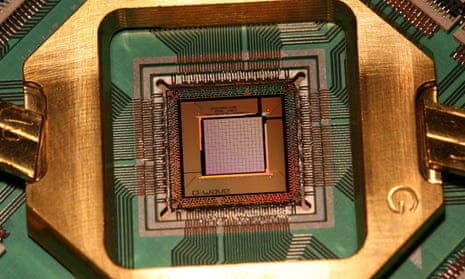The unveiling of the marvel had the media gushing. It was Valentine’s Day 1946, and the New York Times broke the story. The front page spoke of “an amazing machine” and “one of the war’s top secrets”. By crunching numbers at unprecedented speed, the Electronic Numerical Integrator and Computer, with its 18,000 vacuum tubes, was poised to “revolutionise modern engineering”. Eniac would usher in a new epoch of industrial design, some said.
More than 70 years on, another overblown announcement is near. Several companies, notably Google, IBM and the California-based Rigetti, are racing to build a machine that achieves what is grandly termed “quantum supremacy”. The feat will mark the moment when a quantum computer, for the first time, outperforms the best conventional computers. Google, the frontrunner, could claim the record this year.
Quantum computers can solve certain problems much faster than conventional ones. Drug development, materials design, weather forecasts, stock trades – all could potentially be helped by quantum computers that perform scores of calculations at once. Physicists have known this since the 1980s, but have only recently made working prototypes.
Google, like its main competitors, is building what is called a “universal gate” quantum computer. It has similarities to a conventional computer, but while a standard computer handles digital bits of 0s and 1s, quantum computers use quantum bits or qubits which can take any value between 0 and 1. When qubits are connected by quantum entanglement, the phenomenon Einstein called “spooky action at a distance”, such machines can rattle out computations that would take billions of years on a traditional computer. Today’s largest quantum computers have about 20 superconducting qubits. The next generation of chips, those expected to achieve quantum supremacy, will hold at least 50.
Quantum supremacy will be a remarkable achievement for science. But it won’t change the world any time soon. The fact is that algorithms that can run on today’s quantum computers aren’t much use. One of the main algorithms, for example, makes the quantum computer churn out random numbers. That’s great for demonstrating quantum supremacy, but for anything else? Forget it.
The mammoth task of making the machines useful has been eclipsed by quantum enthusiasm. The Boston Consulting Group drew on more than 100 experts and 150 peer-reviewed publications for its recent report on quantum computing. It sees the first applications coming in three to five years, with quantum computers taking on materials simulations that slash costly, time-consuming lab tests. Further ahead their use will spread, and in future decades productivity gains brought about by quantum computers will top $450bn (£372bn) annually, the report asserts.
Well, let’s not get carried away. To compute something useful – say, the chemical properties of a novel substance – would take a few million qubits. But it’s not easy to scale up from 50 qubits to several million. In fact, the challenge is formidable.
The trouble is that quantum systems are exceptionally fragile. To maintain their quantum behaviour, qubit chips are enclosed in sealed boxes fitted with vacuum pumps to remove stray air molecules, or cooled to a fraction of a degree above absolute zero. More qubits means more fridges, more connections and more expense. Worse, these devices are exquisitely sensitive to the smallest disturbances – even footsteps can send them awry. Even when housed in far-flung shelters and accessed through the cloud, it is not clear that a million qubit machine would ever remain stable for long enough to function.
And that’s not all. Quantum computers are not standalone devices. They need a supporting cast of conventional computers and other devices to program, operate and monitor them. Added to that is the computational burden of the machines output. A quantum computer with 10 million qubits running at a few gigahertz would spew out more than 10 terabytes of data per second. That’s a tsunami of information, more than is produced by Cern’s Large Hadron Collider, and it would have to be handled by conventional computers.
Today, a single qubit will set you back $10,000 – and that’s before you consider research and development costs. At that price, a useful universal quantum computer – hardware alone – comes in at at least $10bn. This for a machine whose true commercial value is far from guaranteed. To make quantum computers commercially viable, the cost per qubit will have to drop dramatically. But how this will happen, no one knows. Academics speculate about lumping devices on top of one another, but a report from the National Academy of Sciences is hardly optimistic, saying: “It is not yet clear if or when … these technologies can scale to the level needed” to solve commercially interesting problems.
Those in the field put their faith in Moore’s law, the observation by Intel’s Gordon Moore that the number of transistors that can be housed on a chip doubles every year. But Moore’s law is not a law of nature and I see no reason for optimism. For conventional computers, the game changers were semiconductors, transistors and eventually microchips: in other words, quantum theory. Today’s quantum computers are more akin to the tubes and relays of the Eniac era, with no transistors in sight.
Researchers need to move on. They must take a good, hard look at the quantum computers they are building and ask how will they make them useful. If quantum computers are ever to help solve humanity’s problems, they will have to improve dramatically. Quantum supremacy will be a landmark for computing, but it is where the hard work starts, not where it ends.








